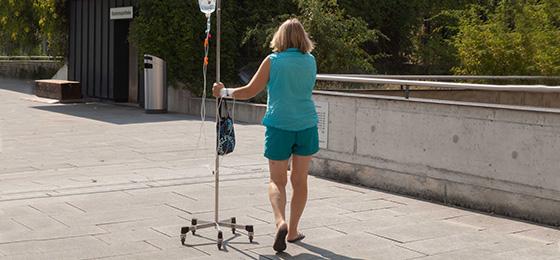01 Patient experiences help improve health care for migrant women

The study identified social, economic and cultural factors that shape migra-tion-related inequalities in health care for women with chronic diseases in Switzerland. Based on patients' expe-riences and including them in all phas-es of the project, specific recommen-dations were developed to improve access to health care.
Project description (completed research project)
The study focused on chronically ill migrant women of Portuguese, Turkish and German origin as well as Swiss women. 48 interviews and two focus groups with patients and 12 interviews with health care providers and social service providers were conducted. Based on the results, stakeholder dialogues with representatives of relevant Swiss institutions and female patients were conducted. Recommendations for improving health care and reducing social inequalities were developed.
Background
Switzerland has one of the best healthcare systems. Yet access to healthcare is limited for certain population groups. Migrant women, for example, use healthcare services less often compared to population average usage although they are more likely to suffer from chronic illness. As yet, the practical experience gained by patients with migrant background has rarely been incorporated into scientific approaches to the problem. Similarly, these women have rarely been engaged in the development of solutions.
Aim
The aim of the study was to investi-gate the causes of inequalities in access to and use of health care services. The goal was to show how chronically ill migrant women experience the health care system, what deficits they perceive and what resources they themselves use and contribute to the health care system. On this basis, new approaches for improved access to health care should be developed with the involvement of affected patients and experts from science and practice.
Results
With regard to better care for female patients with chronic diseases and migration experience, the following need for action was identified:
- Reducing access barriers by promoting low-threshold, multilingual support services at the community and neighbourhood level (information on social services, care services and self-help groups, insurance models and benefits, or patients' rights).
- Actively involving patients as experts of their own disease and promoting a trusting relationship between patients and health care professionals.
- Creating targeted training opportunities for health and social professions on (inter-)professional handling of social and administrative challenges as well as transcultural and trans-categorical approaches in working with chronically ill patients.
Significance of the results for research and practice
This is the first Swiss study to comprehensively explore the relationship between the selfreported health status of immigrant women, their perceived health care needs, experiences with local health care systems, resources and utilization behaviors. It also puts patients’ reports in the center of the research. The participatory character of the study locates the project within the new ‘social practice of public health science’ and increases the potential of the findings to be taken up in health care practice.
Original title
Migrant Women’s Health Care Needs for Chronic Illness Services in Switzerland (MIWOCA)
